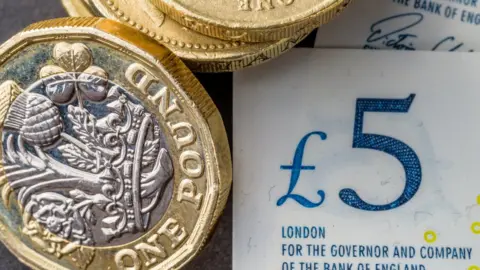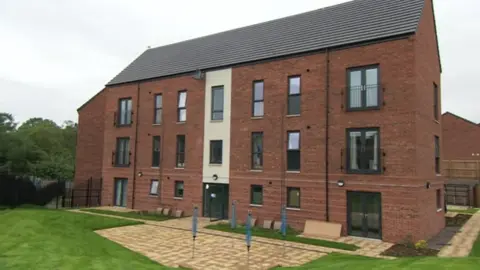Welsh budget 2021: £1.1bn extra confirmed in new spending plans
 BBC
BBCWelsh ministers have confirmed plans to spend an extra £1.1bn in the next financial year.
The final budget for 2021-22 includes an extra £224m for housing, schools and other infrastructure, and £630m for the NHS and councils.
Meanwhile £200m will be set aside to support businesses.
Welsh Conservatives say business rate relief should continue, but ministers want to see what the chancellor will announce for England first.
The Welsh Government said it is waiting to hear what Rishi Sunak says about business rates in his UK government budget speech on Wednesday, and what that means for Wales.
It comes as the cash Welsh ministers expect to receive for Covid-19 spending from the UK government is expected to be less than a sixth of the £5bn it has had for 2020-21.
Plaid Cymru said £200m was a "drop in the ocean" for businesses.
What is the final budget?
The Welsh Government has finalised its spending plans for 2021-22, which they began to spell out in draft form last December and is worth more than £17bn.
In the first financial year of the pandemic, Wales was given an extra £5bn to spend on Covid by the UK government.
Under current plans, this is expected to fall to £766m. Ministers only announced plans for how they would spend 10% of that in December.
Since then, another £650m has been announced by the Treasury for the Welsh Government as a result of additional Covid spending in England.
The final budget confirms some of the extra items that the Welsh Government is spending money on, with the pots of money it had left over from last year.
Money for the pandemic is additional to the £17bn the Welsh Government spends on other policies. It has control in Wales of the NHS, education, environmental spending and transport.
 Getty Images
Getty ImagesWhat is being done for businesses?
The Welsh Government says it is setting aside £200m extra for businesses in its reserves.
It is not decided how that will be spent, and it is not yet clear if an existing business rate relief scheme will continue into the next financial year.
All retail, leisure and hospitality businesses with a rateable value of £500,000 or below are receiving 100% non-domestic rates relief until the end of March.
A similar scheme is operational in England and reports suggest it will continue - Welsh ministers say they are waiting to see how much extra money there is from the Treasury on Wednesday.
Rebecca Evans told BBC Wales the scheme has cost around £360m in the current financial year.
"We would love the chancellor to say that he is intending to continue with the rate relief system," she said.
But she said the "sheer" amount of funding to continue to offer it in Wales means it would need extra money from the UK government.
Most firms closed by lockdown are still awaiting a date on when they can reopen.
Mark Newbold, who owns two pubs near Bridgend, called for more clarity on support for the hospitality sector.
"I know they've put away £200m but that's not enough to support the whole industry," he said. "There are so many businesses that have lost so much money especially last year with the great summer we had."
What about schools, housing and flooding?
The Welsh Government says it is allocating another £224.5m on capital funding - cash spent on infrastructure.
That includes £147m on housing programmes and £30m for new schools.
An extra £8m will be given to councils and Natural Resources Wales to repair damage caused by flooding in December and January, and on wider flooding protection work.
Another £20m will be earmarked for walking and cycling routes, which the Welsh Government said would increase total investment in active travel for the year to £75m.

What new money is being announced for Covid?
At a press conference on Monday, First Minister Mark Drakeford announced £682m in new spending, with some of the money being used to support the vaccination programme.
A total of £630m will go on the NHS and councils, including £206m for a local government hardship fund to support social care and ensure schools can adapt.
NHS services will get £380m, and contact tracing will receive £50m.
Another £10.5m will go to supporting vulnerable people, while £18.6m will be spent on public transport.
How have opposition parties responded?
Welsh Conservative finance spokesman Mark Isherwood said: "The pandemic has devastated the Welsh economy and people and businesses are crying out for more support from Labour ministers so we can support families and save Welsh jobs, but those cries have been sadly ignored.
"After over two decades in power and numerous budgets, successive Labour Governments in Cardiff Bay have failed to deliver for hardworking people, and sadly there's little reason to believe that this budget will be any different - it will only take us back to the same old normal under Labour."
Plaid Cymru economy spokeswoman Helen Mary Jones said there were "large gaps" in the budget.
"By refusing to extend the eligibility criteria for free school meals and to freeze council tax, Labour is failing to protect the most vulnerable from the impact of the pandemic."
She added: "£200m is but a drop in the ocean for businesses who are, like the hospitality sector, on their knees and kept awake at night fearing closure and redundancies."
Where does Welsh Government money come from?
Most of the cash the Welsh Government spends comes directly from the Treasury in London, but about 17% is raised through devolved taxes.
They include part of income tax, land transaction tax - the Welsh version of stamp duty - and landfill tax.
Among the announcements in December was a tax hike on second homes, to raise £13m for social housing.


Although this is called the final budget for the coming financial year, the reality is that it's likely to see many more amendments in the months to come.
The pandemic remains unpredictable, as does the state of the economy, so some of the most recent spending commitments are for a six-month period.
The chancellor's budget on Wednesday will change things too. If the reports of an extension to the business rate holiday in England are correct, Welsh Government may well follow suit here - new spending decisions for England mean more money on the way to Wales.
And there's a Senedd election looming in May, so there may be a few late Easter bunnies being pulled out of hats.
What's more, a change of government - or a new coalition agreement - would mean changed spending priorities.


- WELSH ICONS: Get the inside track on some of Wales' most influential personalities
- X-RAY IS BACK ON THE CASE: The team help some sports fans trying to get their flight money back

